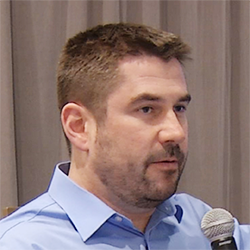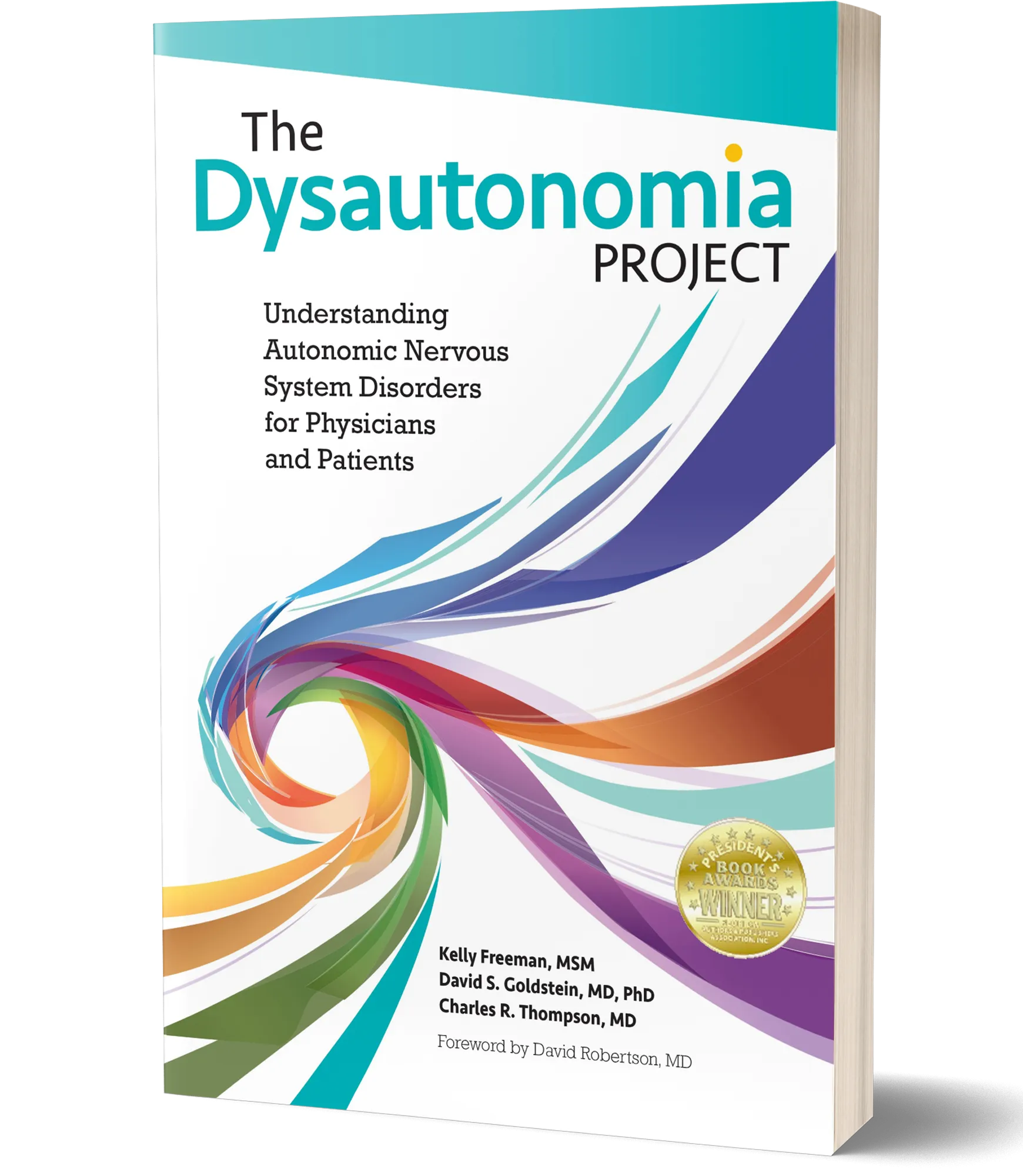Home » Dysautonomias » Autonomic Medicine in Neurology & Autonomic Neuropathy with Christopher Gibbons, MD, MMSc
Autonomic Medicine in Neurology & Autonomic Neuropathy with Christopher Gibbons, MD, MMSc
In this video Dr. Gibbons discusses several autonomic disorders that may be seen in neurological patients across age groups including an explanation of autonomic neuropathy. He also explains the difference between autonomic dysfunction and autonomic failure.
Mr. Al Ruechel: Hi, everybody I’m Al Ruechel thank you for joining us as we continue learning more about dysautonomia. Specifically talking this time about autonomic medicine in neurology. My guest is Doctor Chris Gibbons, Doctor thank you so much for stopping by.
Dr. Christopher Gibbons: Thank you very much for having me.
Mr. Ruechel: So, let’s start out by talking a little bit about you. Give me about some of your background, your education, and what you’re involved in right now.
Dr. Gibbons: Sure, so I’m a neurologist and I’m based at Harvard medical school in Boston and my specialty is in autonomic disorders. So, I’ve had many years of experience now thinking about kind of treating patients with autonomic disorders and a range of them, anywhere from like diabetic autonomic neuropathy to adults with a variety of degenerative diseases like Parkinson’s disease or multiple system atrophy to a variety of symptomatic problems with postural tachycardia or autonomic neuropathies. So, a whole range of autonomic disorders.
Mr. Ruechel: Now, when did we actually start building what I would call a database of knowledge about autonomic medicine in general? Is that talking fifty sixty years ago or is it relatively new in terms of the medical business?
Dr. Gibbons: So, if you’re really interested in historical fiction and information about this. So, for those of you who were ever involved in track or running one of the most famous people is Sir Rodger Banister who was the first individual to break the mile four-minute mark. So, Sir Rodger Banister actually was probably one of the first and most famous autonomic neurologists. So, the very interesting story about that is the day he broke the four-minute mile he actually went then back to the lab to conduct his on-going research on autonomic disorders so this has been something that’s been going on for many many decades, but I think largely in very small numbers.
Mr. Ruechel: So, he had dysautonomia?
Dr. Gibbons: No, no he was a specialized neurologist in autonomic disorders.
Mr. Ruechel: Oh, ok
Dr. Gibbons: So essentially, he was both famous for his work in the field of autonomic disorders and also famous for his work in breaking the four-minute mile.
Mr. Ruechel: Yeah, yeah which I haven’t done yet. Not many people have done it still. So, let’s talk about something that we’ve talked about in some of our other segments, called autonomic neuropathy, explain to me what that is.
Dr. Gibbons: So that’s really just a description saying a nerve damage problem specifically affecting the nerves that go to the autonomic organs and so that the structures and the function that relates to that. So, for example sweat function or bowel function or bladder function these are all autonomic controlled organs and the nerves that go to them. So, an autonomic neuropathy would really be damage to those specific nerves and largely in the peripheral nervous system. So, we talk about the central nervous system which is the brain and the spinal cord and then once the nerves leave that area that’s the peripheral nervous system and that’s generally where the autonomic nerves are damaged in an autonomic neuropathy.
Mr. Ruechel: It’s interesting because the word neuropathy we’ve heard it a lot lately and mostly because figured out how to make money off of it and they used to talk about neuropathy and the first thing the consumer thinks of is “oh my feet my feet” that’s the first part of it. But are these neuropathies the kind of things that destroy the nerve endings or are these things that damage them or do they numb them, what happens to them?
Dr. Gibbons: So, you’re absolutely right in describing it that way because they are doing similar things to different nerve types and if its hitting a sensory nerve for example the most common example that would be diabetic neuropathy where the sensory nerves are damaged and they lose the ability to sense or feel in their feet first and it might be painful or burning. They also have autonomic neuropathy that goes along with that in which case they lose control of the peripheral autonomic nerves, they can lose control of blood pressure and sweat function and so these are autonomic nerves that are damaged in the same process in the same way.
Mr. Ruechel: Do they cascade? Like if you have one neuropathy that begins can that cascade into multiple neuropathies?
Dr. Gibbons: Well it doesn’t necessarily spread from one disease to another but generally a disorder that affects one nerve will in fact affect the other. Some may be more sensory predominant so it’s more sensory some may be more autonomic predominant and there’s a bit of a back and forth but most of the patients that we see will have a little bit of both, some may be more heavily weighted but that’s often why they are very confusing to a lot of physicians because this picture, the presentation that occurs very different depending on a what nerve is damaged.
Mr. Ruechel: Does it get… clinically does it get worse, in other words you may have started this and you wondered what the symptoms were but then clinically it does actually get worse to the point that when you come into a doctor it’s like it isn’t just a minor thing it’s something that’s really affecting my life.
Dr. Gibbons: Exactly, and that’s unfortunately what we’re really trying to identify early, if we can identify the underlying problem maybe we can treat it and prevent it from getting to that issue.
Mr. Ruechel: Ok, so how do we get to that point where we identify those underlying symptoms if you want to call them that?
Dr. Gibbons: Yeah, so an example today we actually talked about in some of our earlier autonomic society sessions was the concept of amyloidosis and so this is a protein disorder where an abnormal protein, in people who have a hereditary form of this disease it accumulates in the body in various places, it may affect the heart, it may affect the nerves but as it accumulates over time and damages these systems and causes more and more disease. However, there are several new treatments that have come out that halt the progression of this protein and stop the disease in its tracks which really is a miracle for these patients which is incredible and that’s the type of thing we are hoping to reproduce across different diseases. So, defining the underlying disease is really critical because that’s the first step in the road to a treatment.
Mr. Ruechel: Now, do all neurologist know what you know? I don’t mean specifically in what you know because obviously you’ve been doing a lot of research but in terms of, what we’re trying to do with these videos is to let other neurologists know that hey these are things that you might want to be looking for.
Dr. Gibbons: So, I think largely the answer is no. Unfortunately, the autonomic nervous system is typically considered almost a black box of medicine. It’s a number of different confusing symptoms that occur that are difficult to decipher to the person who has not had a lot of familiarity or training in the system. So, it does get very confusing and I think that’s largely one of the biggest challenges to treating these types of disorders.
Mr. Ruechel: When you said black box boy you described it really well because people don’t understand it. So, let’s talk a little bit about these neuropathies as it relates to age groups. Is it different for each age group?
Dr. Gibbons: It is actually, strikingly so. So, you may have very young pediatric patients who have hereditary disorders and these are people who have inherited an abnormality or acquired a mutation that results in a bad disease very early in life and so they may have degeneration of the autonomic nervous system starting at birth and progressing and many of these kids won’t make it out of childhood. So, these are terrible diseases but those are quite rare and I would say that’s not a common presentation but that’s clearly an area of concern in early life. And then as people go into later life, teenage and beyond that’s when we start to acquire diseases. So, people might say develop type one diabetes or they might develop amyloid or other disorders that come on top of a normal functioning person and start to create these challenges. And then as we move into later life that’s when we start to see what we call neurodegenerative disorders and that would be your Parkinson’s disease or your autonomic failure syndromes that results in damage to the autonomic nervous system. But there really are discrete periods of life where certain disorders occur and are most likely.
Mr. Ruechel: Wow, so one of these that we’re trying to do is were trying… I’m going to ask you to do something that might be kind of difficult, what is your message to a neurologist right now, if there was one thing you said if you walk away from this video and you remember one thing this is what I want you to remember, that’s for physicians and then we’ll talk about patients.
Dr. Gibbons: So, I think the one thing to try to stress is that there are some basic principles with this that are capturable and understandable, digestible if you were, if you will. That’s the important part, this is challenging but not impossible to understand and being willing and taking the time to learn this, absolutely you can become very familiar with the process.
Mr. Ruechel: And for patients, because I know this is a rough road for people.
Dr. Gibbons: And I think the biggest challenge for patients and this has been the biggest complaint for us and for largely the medical community at large is finding the right person who can help them through their disease process and I think what you want to start with is running through the usual path through your primary care doctor to make sure it’s not some obvious problem that you’re exhibiting. But once you’re sort of at that stage then being able to refer on to somebody who has experience with the autonomic disorders and we have autonomic disorder training programs, the number of specialists is gradually increasing so it is helpful but again it’s still challenging but there are centers around the country that are available where people can absolutely be seen and so these are places that you can really seek help.
Mr. Ruechel: Well that’s great because there are millions of people that are affected by this and that don’t even know it. Doctor thank you so much for the information, you’ve been very helpful.
Dr. Gibbons: You’re very welcome, very nice to meet you. Thank you.

Wolfgang Singer, MD
Associate Professor of Neurology
Mayo Clinic Rochester, MN
































Listening to Dr. Gibbons has given me hope as a patient with autonomic dysfunction that is impacting my quality of life. I will reach out to Dr. Gibbons because I live in MA and can travel to his office. Thank you for helping find him.